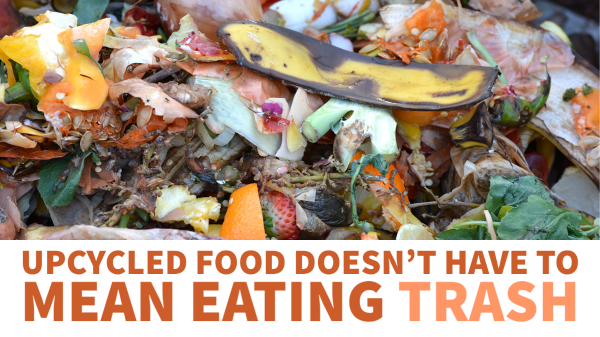When I was a boy, my grandmother in Connecticut had apple trees in her yard.
With rare exceptions, nobody bothered to pick the fruit from the trees. We simply gathered up the grounders.
The apples didn’t look that great, and often had bruising and insect damage. I don’t remember eating them fresh very often (although as kids, we did throw them at one another). But we would take the grounders and carefully chop them, removing the bug damage and the brown spots, and my aunt would put them through the juicer.
After all, apple cider is de rigueur in a New England fall.
We didn’t know it, but we were upcycling (a term I don’t know well)—taking something that would otherwise be wasted and turning it into a desirable product.
Now I gather from Bon Appétit magazine that upcycling has become a fashionable trend in cuisine.
Maggie Lange’s article highlights a number of upcycled products that she has sampled. Not all of them involve produce: Goodfish takes discarded salmon skins, which are “dried and then fried into perfectly crunchy, lightly salted morsels.” (When we have salmon at home, I eat the skin, though my wife doesn’t.)
Some items do salvage produce: “Spudsy collects sweet potatoes that are landfill-bound due to perceived cosmetic flaws like shape, size, or color. They dry and grind the rescued bounty into flour, which is used to make the brand’s line of puffed snacks.”
Rinds are a chewy dried fruit snack that uses everything, including, of course, the rinds. Surprisingly, Ms. Lange writes, “I particularly adored the kiwi, which boasts a deep tang that won’t quit.” (I never thought of kiwi peels as appetizing or even edible.)
Seconds is a brand that turns recycled carrot pulp into “very hardy crackers,” which are “mild and earthy.”
What you have just learned from this article—if you did not know it already—is that practically any discarded fruit or vegetable can be reprocessed into a snack. In view of the ludicrous prices that these items fetch per ounce, this has got to be a lucrative option, at least sometimes.
This idea may not revolutionize business for many growers and shippers, but it is an idea worth keeping in mind as possibilities for creative options open up.



